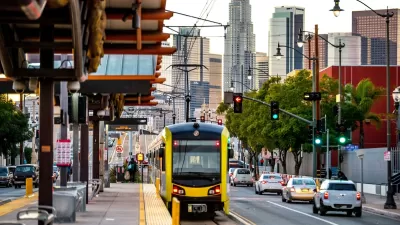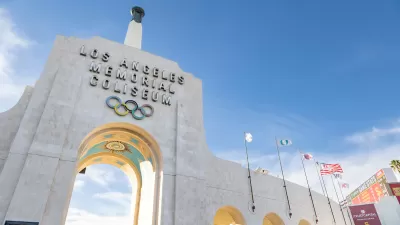In the American city most synonymous with the automobile, car ownership is declining and transit use is increasing. As the country's transportation model enters a decade of profound change, L.A. may provide the 'ultimate test' of the car’s future.
"The city that put drive-thru restaurants on the map has doubled its network of bike lanes to 292 miles (470 kilometers) and expanded light rail by 26 percent in the past eight years, with another 18 miles of track coming by 2015," writes James Nash. "Bus and train ridership is on the rise, while the total number of passenger cars registered has declined in Los Angeles County -- evidence more commuters are breaking their dependence."
"The one-family car Americans grew up with, combustion-engined and gasoline-powered, is under assault from an array of options: electric cars, hybrids and alternatives like bikes, light-rail and car-sharing plans such as the one operated by Avis Budget Group Inc. (CAR)’s Zipcar Inc. (ZIP)," he continues. "Los Angeles, the largest market in the biggest U.S. state for vehicle sales, could be the ultimate test of the conventional car’s future."
“'The next 10 years will be as important to the auto industry and transportation literally as the invention of the Model T,' Scott Griffith, former chief executive officer of Zipcar and a strategic adviser to the company, said at the Bloomberg Link Next Big Thing Summit in Half Moon Bay, California, on June 17. 'We’re now on the edge of all these new business models coming along and the intersection of information and the car and transportation. If you look out 10 years, I think we’re going to see a huge change, particularly in cities.'”
FULL STORY: L.A. Breaks Driving Addiction as Bike-Train Commutes Grow

Alabama: Trump Terminates Settlements for Black Communities Harmed By Raw Sewage
Trump deemed the landmark civil rights agreement “illegal DEI and environmental justice policy.”

Planetizen Federal Action Tracker
A weekly monitor of how Trump’s orders and actions are impacting planners and planning in America.

The 120 Year Old Tiny Home Villages That Sheltered San Francisco’s Earthquake Refugees
More than a century ago, San Francisco mobilized to house thousands of residents displaced by the 1906 earthquake. Could their strategy offer a model for the present?

LA’s Tree Emergency Goes Beyond Vandalism
After a vandal destroyed dozens of downtown LA trees, Mayor Karen Bass vowed to replace them. Days later, she slashed the city’s tree budget.

Sacramento Leads Nation With Bus-Mounted Bike Lane Enforcement Cameras
The city is the first to use its bus-mounted traffic enforcement system to cite drivers who park or drive in bike lanes.

Seattle Voters Approve Social Housing Referendum
Voters approved a corporate tax to fund the city’s housing authority despite an opposition campaign funded by Amazon and Microsoft.
Urban Design for Planners 1: Software Tools
This six-course series explores essential urban design concepts using open source software and equips planners with the tools they need to participate fully in the urban design process.
Planning for Universal Design
Learn the tools for implementing Universal Design in planning regulations.
Ada County Highway District
Clanton & Associates, Inc.
Jessamine County Fiscal Court
Institute for Housing and Urban Development Studies (IHS)
City of Grandview
Harvard GSD Executive Education
Toledo-Lucas County Plan Commissions
Salt Lake City
NYU Wagner Graduate School of Public Service





























